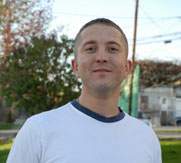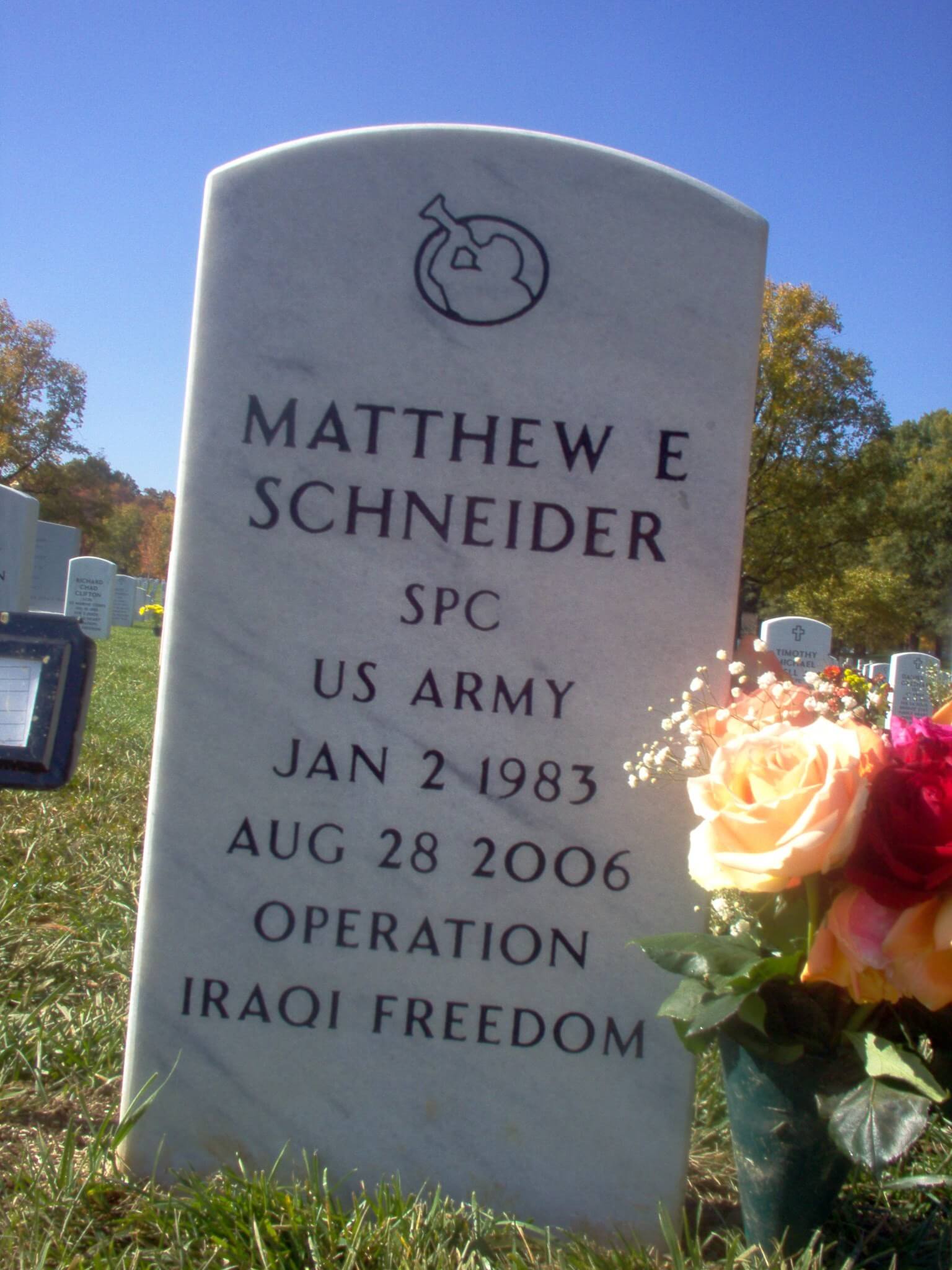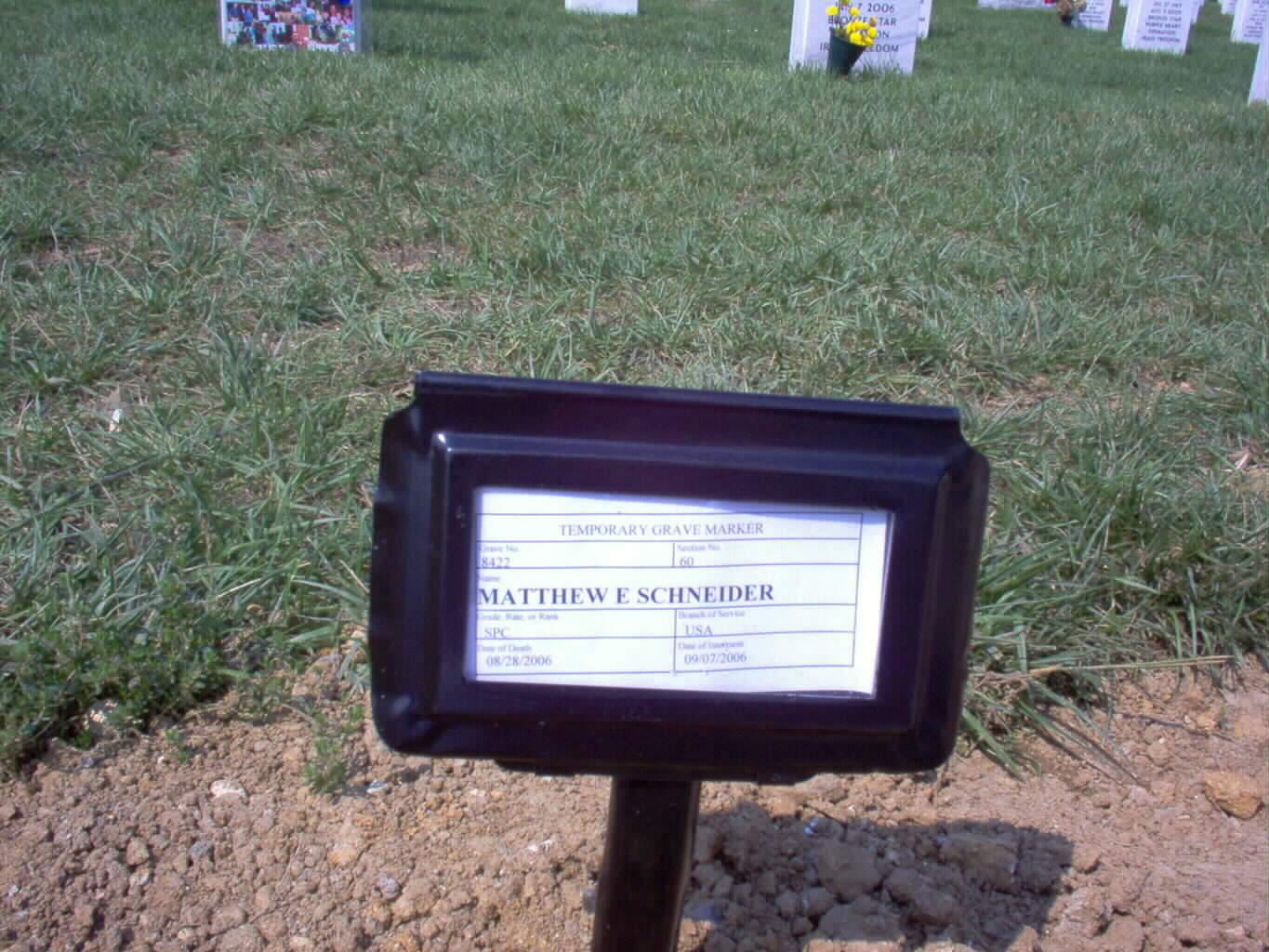NEWS RELEASES from the United States Department of Defense
No. 833-06 IMMEDIATE RELEASE
August 30, 2006
DoD Identifies Army Casualty
The Department of Defense announced today the death of a soldier who was supporting Operation Iraqi Freedom.
Specialist Matthew E. Schneider, 23, of Gorham, New Hampshire, died on August 28, 2006, in Ar Ramadi, Iraq, from a non-combat related cause. Schneider was assigned to the 141st Signal Battalion, 1st Armored Division, Wiesbaden, Germany.
The incident is under investigation.
August 31, 2006:
A soldier who died of an apparent heart attack in Iraq this week was born with a heart condition that his parents said seemed to disappear during his childhood. The death of Specialist Matthew Schneider, a Gorham, New Hampshire native who was found dead in his bunk in Ar Ramadi, was perplexing to his father because the soldier was in top shape.
“I spoke to him about five hours before he died and he complained of nothing,” said Andrew Schneider, who lives in Kittery, Maine. “This was a kid cranking out 100 pushups and he was proud of the miles he could run.”
The 6-foot, 175-pound soldier who easily passed his physical training and was given a clean bill of health when he entered the Army was unresponsive in his bunk Monday morning. He was rushed to a medical facility but could not be revived.
His mother, Cynthia Tardiff, who now lives in Lunenberg, Vermont, said her son was born with a condition that causes heart muscle to grow abnormally, but that it apparently had cleared up by the time Schneider was two years old.
The military is planning an autopsy and investigation into the death, which has delayed funeral arrangements, the soldier’s father said.
Schneider, 23, was assigned to the 141st Signal Battalion of the 1st Armored Division based in Wiesbaden, Germany.
“He was super happy with his education and super happy to serve in the armed forces,” Andrew Schneider said. Schneider, who ran a communications station, had re-enlisted in the Army to train as a systems administrator.
Schneider was a 2001 graduate of Gorham High School and was well liked by his teachers and classmates, according to Principal Keith Parent. Teachers said he excelled at computer skills and created a Web page for the students.
Schneider was one of the first students at the school involved in the Cisco Networking Academy, a program that provides training for students interested in the technology field.
He kept his passion for computers worked at his father’s Internet company before reporting to duty in the Army.
He was remembered for more than his computer skills, though.
Assistant Principal Bill Kaczenski said faculty members recalled his thoughtfulness and his practical jokes, as well as a knowledge of computers that surpassed most adults.
Schneider showed his computers skills — and his humor — by playing tricks on his fellow students. “There were a couple of times he’d freeze up people’s computers as a giggle-giggle ha-ha,” Kaczenski said.
Andrew Schneider said he has spoken to twice to Maine Governor John Baldacci, who’s assisting in burial arrangements at Arlington National Cemetery. It could be two or three weeks before the funeral is held, he said.
28 August 2006:
A Gorham, New Hampshire, soldier who was born with a heart condition died in Iraq on Monday, apparently from a heart attack. Specialist Matthew E. Schneider, 23, was found lying on his bunk in Ar Ramadi at about 9 p.m. Iraq time, said his father, Andrew Schneider. He was unresponsive and could not be revived.
The Army is investigating the cause of Schneider’s death, but his parents say initial lab tests reveal Schneider had a heart attack. Army officials would not confirm the cause of Schneider’s death yesterday.
Schneider was born with a heart defect called idiopathic hypertrophic subaortic stenosis, said his mother, Cynthia Tardiff. The condition causes heart muscle fibers to grow abnormally, which can thicken the heart muscle and limit its pumping ability.
Schneider was not expected to live through his infant years, Tardiff said. But when Schneider was 2, his symptoms seemed to disappear and tests on his heart, like electrocardiograms, came back normal, she said.
Last Sunday, Tardiff received an e-mail from her son, who had been in Iraq for six months with the 141st Signal Battalion of the of the 1st Armored Division, a unit based in Wiesbaden, Germany. Schneider, who loved running and working out at the gym, told her that he was going to stop running for a little while. He had been caught in a sandstorm while he was running a few days earlier, he told her, and he was having trouble breathing.
About six hours before he died, Schneider called his father after finishing a run, Tardiff said. In a message Schneider left on his father’s answering machine early Monday morning, he said he was going to take a shower and wished his father a happy birthday.
“I love you, and I miss you,” he said in the message. “I think about you all the time.”
Andrew Schneider said his son had been cleared for military service and had not shown symptoms of heart trouble since he was 6 months old. He said he didn’t want to speculate whether the condition caused his son’s death.
Schneider, who attended Gorham Middle/High School, was a technology guru, which suited him well for his work in the 141st Signal Battalion, a support unit that manages communication, including electronic and telephone communication.
As a teenager, Schneider knew enough about computers to play pranks on his classmates; they’d find their disc drives opening and closing when they hadn’t touched any buttons, their computers flicking on and off, said Jackie Corrigan, who taught business and technology classes at Gorham Middle/High School.
“He had a bit of a mischievous side,” said Corrigan, who retired in January. “He was devilish in that way, but never destructive.”
Schneider’s love of computers started early, and during his four years of high school, he took every class Corrigan offered. He helped teachers and other students with their computers, and Corrigan sometimes sent him to help local businesses that were having computer problems, said Andrew Schneider.
“He was just tremendous,” said William Kaczenski, assistant principal at Gorham High.
During his senior year, Schneider was one of two students who earned college credit in a computer technology course Corrigan introduced. After he graduated in 2001, Schneider attended New Hampshire Community Technical College in Nashua on a scholarship, his father said.
But Schneider didn’t feel focused; he said he hadn’t found his purpose, Tardiff said. Schneider decided to join the military in October of 2004.
In the Army, Schneider shed unwanted extra pounds he’d had since high school, his father said. He felt fit and proud to be in the Army. He was energized to map out his future, and he planed to re-enlist and become an information technology specialist, Andrew Schneider said.
Schneider was not involved in combat in Iraq; he helped provide frontline soldiers with communication support. In his spare time, Schneider set up a wireless network that linked 80 of his fellow soldiers with high-speed internet access, Andrew Schneider said.
Schneider told his mother that soldiers “feel bad” that Americans at home think the war in Iraq is “a waste of time and people.” Schneider said it made him feel good to help the Iraqis, Tardiff said.
In May, Tardiff heard footsteps in the garage of her home in Lunenburg, Vermont. When she stood to see who was coming, she saw her son in his uniform; he’d come home on leave and wanted to surprise her.
“He was so self-confident,” she said. “He was a man.”
She added, “He treated me so nicely on that visit. I’m glad I had that.”
Schneider is survived by an older sister, Sarah Gray, 27, of Fairfax, Virginia, and three stepbrothers: David Guenette, 38, of San Francisco, Matthew Guenette, 34, of Madison, Wisconsin, and Martin Guenette, 30, of Providence, Rhode Isalnd.
Schneider will be buried at Arlington National Cemetery in Virginia, but the service had not been scheduled as of last night.
Two Laid to Rest Had Beaten the Odds
Baltimore Marine Was on Third Tour; N.H. Soldier Suffered Apparent Heart Attack
By Megan Greenwell
Courtesy of the Washington Post
Friday, September 8, 2006
Marine Staff Sergeant Dwayne E. Williams had survived three concussions from dismantling hundreds of roadside bombs in Iraq. Army Specialist Matthew E. Schneider had overcome a heart condition that a doctor said would kill him before he was a toddler.
The Marine and the soldier who were used to beating the odds were buried near each other at Arlington National Cemetery yesterday.
Mourners show support during a prayer at the burial of Marine Staff Sergeant Dwayne E. Williams, 28, of Baltimore, who died August 24, 2006, while dismantling a roadside bomb, a feat for which he had already been awarded a Bronze Star. Williams is survived by his wife, LaStar, and 4-year-old son, Malachi.
Williams, a 28-year-old Baltimore native, was dismantling yet another improvised explosive device — a feat for which he had already been awarded a Bronze Star — in Anbar province on August 24, 2006, when the device exploded, killing him and another soldier.
Schneider, a 23-year-old from Gorham, New Hampshire, was relaxing on his bunk in Ramadi when he suffered an apparent heart attack August 28, 2006.
At services yesterday, Williams’s wife, LaStar, and 4-year-old son, Malachi, received a flag from a Marine sergeant to honor his contributions to the war. As a bugler played taps, family members and friends huddled, never removing their eyes from the flag-draped coffin.
“What made me cry is now his son won’t have a father, like Dwayne didn’t have a father,” said Melissa Manning, a cousin of Williams’s who said their relationship was more like brother and sister. “He was trying to be a good dad, and that’s what I’m mad about.”
She said that Williams had grown up in a tough neighborhood in Baltimore but stayed away from gangs and drugs because he knew they would interfere with his goals.
Although dismantling bombs is among the most dangerous assignments in Iraq, Williams thrived on it, family members said. He came from a family of military veterans dating to World War I and had long planned to enter the service before enlisting nine years ago. He was on his third tour of duty in Iraq, and his family was anticipating his return to the United States later this month.
“I don’t support war, so I didn’t want him to go,” Manning said. “But he thought it would be a good opportunity to go to school and to see the world and to do something important. That’s the promise that the Marines give.”
In the face of war, Williams relied on the love of his family and God to stay strong, she said. He called his mother every day and wrote lengthy e-mails that were posted on a family Web site. He saved the lives of his comrades at least once, screaming to them to take cover after he disconnected one bomb only to find another nearby.
“I found another device set as a trap for us. I yelled ‘IED’ so others could run,” he wrote. “Four Marines including myself were within the blast radius of this item. The Lord is good.”
An only child, Williams was especially close to his extended family. He lived with Manning for two years before being deployed to Iraq, she said.
“We liked to joke with each other, go out to eat, go see movies,” she said. “He was so gifted at building things, drawing and all sorts of things. If I needed something fixed, he could fix it, and he was so down-to-earth.”
Less than 30 minutes after Williams was buried, Schneider’s family arrived at the same section of the cemetery to bury their son and brother. A Mormon chaplain praised the young man’s desire to help people, whether Americans or Iraqis.
“We’re here to honor Matthew’s devotion to duty,” he said.
The chaplain told the assembled crowd about a time when Schneider came upon a woman whose purse had been stolen. Without thinking twice, Schneider went to the nearest ATM and withdrew $200 to give to the woman, he said.
A technological whiz, Schneider spent his spare time in Iraq setting up high-speed Internet connections for about 80 soldiers. His job was to maintain communication with those on the front lines, and he planned to reenlist in the military as an information technology specialist.
Williams and Schneider are the 260th and 261st military personnel killed in Iraq to be buried at Arlington.
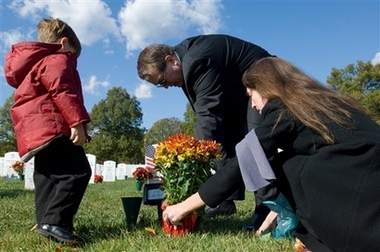
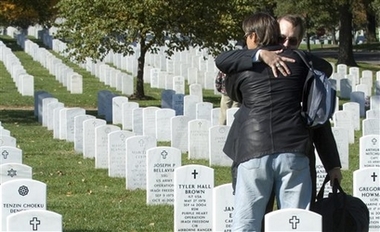
Michael Robert Patterson was born in Arlington and is the son of a former officer of the US Army. So it was no wonder that sooner or later his interests drew him to American history and especially to American military history. Many of his articles can be found on renowned portals like the New York Times, Washingtonpost or Wikipedia.
Reviewed by: Michael Howard

